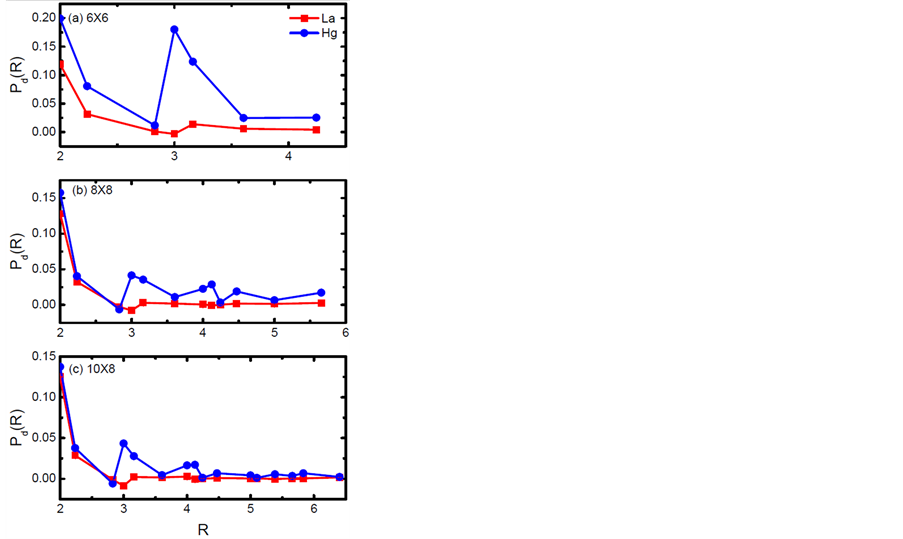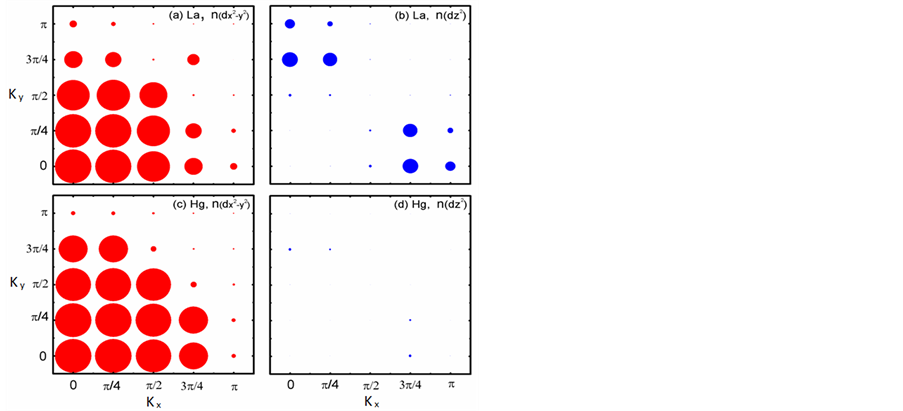1. 引言
自从铜氧化物高温超导体发现以来,对其反常物理特性和超导机理的理解一直是凝聚态物理学中的前沿研究课题。大量的实验研究已经确认d波是超导能隙函数的主要部分 [1] - [3] ,这为理解超导机理提供了可靠的实验依据。同时,人们发现不同系列的铜氧化物材料具有不同的超导临界转变温度。这和材料晶体结构中所含有的CuO2层数紧密相关,一般而言CuO2层越多,超导临界转变温度Tc就越高。但是即使都是单层铜氧化物结构的材料,其超导临界转变温度也有非常大的差距,例如La2−x(Sr/Ba)xCuO4的Tc约为40 K [4] ,而HgBa2CuO4+x的Tc却高达90 K [5] 。
为了解释不同系列铜氧化物高温超导体的超导特性差异,人们基于含近邻跃迁t和次近邻跃迁t’的单轨道模型开展了大量的理论研究工作,其中Hg系的次近邻跃迁值比La系的值要大。基于t-t’-J模型的变分蒙特卡罗 [6] 和运动方程 [7] 研究发现随着t’的增大,d波超导受到明显增强,这和实验结果一致。另一方面,基于t-t’-U单带哈伯德模型的量子蒙特卡罗 [8] [9] 和动态团簇 [10] 研究发现t’的增大将导致d波超导受到显著抑制。上述研究结果表明从单轨道模型出发难以得到统一的结论。最近,Sakakibara等人 [11] [12] 根据第一性原理计算的结果提出了描述单层铜氧化物高温超导体的双轨道模型,其中包含 和
和 两个轨道,前者源于Cu的
两个轨道,前者源于Cu的 和铜氧平面内O的2pσ轨道,后者源于Cu的
和铜氧平面内O的2pσ轨道,后者源于Cu的 和顶角O的2pz轨道。他们进一步采用涨落交换近似研究了模型的超导特性,发现随着
和顶角O的2pz轨道。他们进一步采用涨落交换近似研究了模型的超导特性,发现随着 和
和 轨道间能量差的增大,d波超导显著增强。该结果成功地解释了为什么具有较大能量差的Hg系呈现出更高的Tc。
轨道间能量差的增大,d波超导显著增强。该结果成功地解释了为什么具有较大能量差的Hg系呈现出更高的Tc。
在本文中,考虑到铜氧化物高温超导体中电子关联和量子涨落对其物理特性具有重要的影响,我们将采用约束路径量子蒙特卡罗方法 [13] - [16] 深入研究Sakakibara等人提出的双轨道模型。我们的研究工作一方面可以检验近似计算所得结论是否可靠,另一方面通过分析自旋关联函数和空穴分布与模型参数的依赖关系可以加深理解不同体系具有不同超导特性的根源。
2. 模型结构和哈密顿量
对于单层铜氧化物高温超导体,我们采用如下的哈密顿量加以描述 [12] 。
 (1),
(1),
这里i,j分别代表不同的格点,u,ν则表示两个轨道,σ表示电子自旋。 表示在
表示在 或
或 轨道产生一个空穴,
轨道产生一个空穴, 为粒子数算符。
为粒子数算符。 表示u轨道的能量,
表示u轨道的能量, 表示轨道间或轨道内电子的跃迁积分,U代表同一轨道上的在位库仑相互作用。
表示轨道间或轨道内电子的跃迁积分,U代表同一轨道上的在位库仑相互作用。
在表1中,我们列出了La系和Hg系的模型参数值,其中ΔE代表 和
和 轨道间的能量差,t1、t2、t3分别表示近邻、次近邻、第三近邻格点间
轨道间的能量差,t1、t2、t3分别表示近邻、次近邻、第三近邻格点间 轨道内的跃迁积分,而t4表示近邻格点两个轨道之间的跃迁积分。
轨道内的跃迁积分,而t4表示近邻格点两个轨道之间的跃迁积分。
为了分析模型(1)的超导特性,我们定义了如下的d波配对关联函数 [8] 。
 (2)
(2)
上式中 代表近邻格点间
代表近邻格点间 轨道上的d波配对算符。当
轨道上的d波配对算符。当 时,
时, ;当
;当 时,
时, 。
。
模型的磁性通过 轨道上的自旋结构因子
轨道上的自旋结构因子 来加以表征,其定义如下:
来加以表征,其定义如下:
 (3)
(3)
上式中N为模拟晶格的格点数。
3. 计算结果与讨论
我们对具有周期性边界条件的6 × 6、8 × 8、以及10 × 8有限尺寸晶格进行了量子蒙特卡罗模拟计算,并集中分析了最佳掺杂浓度0.15附近的磁性和超导特性。哈密顿量(1)中U取为 ,上述三个晶格的空穴填充数目分别为42、74、94,相应的空穴掺杂浓度分别为0.167、0.156、0.175。图1显示三个晶格上La系和Hg系的d波配对关联函数随库伯对之间距离R的变化行为。我们可以清楚地看到,尽管不同晶格上的配对关联函数由于有限尺寸效应而存在较大的差异,但是Hg系的长程(R > 2)配对关联函数均大于La系的值,这说明Hg系有利于形成更高Tc的d波超导态。这与实验结果完全相符合,同时证实了Sakakibara等人的涨落交换近似计算结果 [11] [12] 。
,上述三个晶格的空穴填充数目分别为42、74、94,相应的空穴掺杂浓度分别为0.167、0.156、0.175。图1显示三个晶格上La系和Hg系的d波配对关联函数随库伯对之间距离R的变化行为。我们可以清楚地看到,尽管不同晶格上的配对关联函数由于有限尺寸效应而存在较大的差异,但是Hg系的长程(R > 2)配对关联函数均大于La系的值,这说明Hg系有利于形成更高Tc的d波超导态。这与实验结果完全相符合,同时证实了Sakakibara等人的涨落交换近似计算结果 [11] [12] 。
为了理解Hg系具有更高Tc的物理原因,我们在表2中列出了 轨道上的磁矩平方值
轨道上的磁矩平方值 、空穴占据数
、空穴占据数 、
、 轨道上的空穴占据数
轨道上的空穴占据数 、以及反铁磁波矢
、以及反铁磁波矢 处的自旋结构因子
处的自旋结构因子 。从表2中我们可以看出,La系和Hg系中
。从表2中我们可以看出,La系和Hg系中 轨道上的磁矩和自旋结构因子取值较为接近。按照d波超导的反铁磁自旋涨落交换机制,体系的反铁磁自旋关联越强,越有利于d波超导配对的形成。显然,La系和Hg系中反铁磁自旋关联的差别程度太小,因而难以解释这两个体系超导特性的显著差异。
轨道上的磁矩和自旋结构因子取值较为接近。按照d波超导的反铁磁自旋涨落交换机制,体系的反铁磁自旋关联越强,越有利于d波超导配对的形成。显然,La系和Hg系中反铁磁自旋关联的差别程度太小,因而难以解释这两个体系超导特性的显著差异。
从表2中我们还发现,空穴主要分布在 轨道上,而
轨道上,而 轨道上的空穴浓度较低,这是因为后者的轨道能量较高的缘故。两个超导体系的一个重要差别是Hg系的
轨道上的空穴浓度较低,这是因为后者的轨道能量较高的缘故。两个超导体系的一个重要差别是Hg系的 显著大于La系的值,而
显著大于La系的值,而

Table 1. The parameters used in our calculations for La- and Hg-based systems. ΔE denotes the energy difference between and orbitals. t1, t2, and t3 stand for the first, second, and third neighbor hoppings for the orbital, and t4 stands for the nearest-neighbor hopping between two orbitals
表1. 表中列出La系和Hg系的双轨道模型参数值。ΔE代表 和
和 轨道间的能量差,t1、t2、t3分别表示近邻、次近邻、第三近邻格点间
轨道间的能量差,t1、t2、t3分别表示近邻、次近邻、第三近邻格点间 轨道上的跃迁积分,而t4表示近邻格点两个轨道之间的跃迁积分
轨道上的跃迁积分,而t4表示近邻格点两个轨道之间的跃迁积分

Table 2. Square of magnetic moment m2 and S(π,π) on the orbital. The hole occupations and. The results are given for 6 × 6, 8 × 8, and 10 × 8 lattices
表2. 三个晶格中 轨道上的磁矩平方值m2,(π,π)点的自旋结构因子S(π,π),以及两个轨道上的空穴占据数
轨道上的磁矩平方值m2,(π,π)点的自旋结构因子S(π,π),以及两个轨道上的空穴占据数 和
和

Figure 1. The d-wave pairing correlation function Pd(R) of La- and Hg-based systems as a function of distance R. (a), (b), and (c) show the results for the 6 × 6, 8 × 8, and 10 × 8 lattices
图1. La系和Hg系的d波配对关联函数Pd(R)随库伯对间距R的变化曲线。(a)、(b)、(c)分别给出6 × 6、8 × 8、以及10 × 8晶格上的计算结果

Figure 2. The distribution of holes in the Brillouin zone of La- and Hg-based systems on the 8 × 8 lattice. The sizes of filled circles are proportional to the hole occupations
图2. 8 × 8晶格中La系和Hg系各轨道上的空穴在布里渊区中的分布,其中圆圈的大小正比于空穴数


Figure 3. The d-wave pairing correlation function of La- based (a) and Hg-based (b) systems as a function of distance R at different ΔE. The inset figures show the ΔE dependence of hole occupation on the  orbital and S(π,π)
orbital and S(π,π)
图3. 8 × 8晶格中ΔE取不同值时,La系(a)和Hg系(b)的d波配对关联函数随库伯对间距的变化行为。其中的小图显示 轨道上的空穴和S(π,π)随ΔE的变化情况
轨道上的空穴和S(π,π)随ΔE的变化情况
的情况则恰恰相反。由于三个晶格上的空穴掺杂浓度均接近最佳掺杂浓度0.15,轨道上的空穴占据数说明Hg系中掺杂空穴主要占据 轨道,而La系中掺杂空穴主要占据
轨道,而La系中掺杂空穴主要占据 轨道。
轨道。
为了进一步观察空穴在动量空间的分布特征,我们在图2中给出8 × 8晶格四分之一布里渊区中各个波矢(kx,ky)处的空穴占据数。由图2可以看出在反节点(π,0)和(0,π)附近,La系 轨道上的空穴占据数明显高于Hg系的值,而在反节点(π,0)和(0,π)的连线附近,Hg系
轨道上的空穴占据数明显高于Hg系的值,而在反节点(π,0)和(0,π)的连线附近,Hg系 轨道上的空穴占据数显著大于La系的值。由于反节点连线附近的空穴可以通过交换反铁磁自旋涨落形成库伯对,因而Hg系相比于La系有更多的空穴参与库伯配对,从而在磁关联相似的情况下可以形成更高的超导临界转变温度。
轨道上的空穴占据数显著大于La系的值。由于反节点连线附近的空穴可以通过交换反铁磁自旋涨落形成库伯对,因而Hg系相比于La系有更多的空穴参与库伯配对,从而在磁关联相似的情况下可以形成更高的超导临界转变温度。
最后,为了进一步说明 和
和 轨道之间的能量差ΔE对d波配对关联函数的影响,我们在图3中给出ΔE取不同值时,8 × 8晶格上La系(图3(a))和Hg系(图3(b))的d波配对关联函数随库伯对间距R的演化行为。这里ΔE包含La系和Hg系的原始值,以及两者的平均值。在两个超导体系中,我们发现d波配对关联函数均随ΔE的增大而明显增强。图3内插图表明反铁磁自旋关联未受到ΔE的强烈影响,但是
轨道之间的能量差ΔE对d波配对关联函数的影响,我们在图3中给出ΔE取不同值时,8 × 8晶格上La系(图3(a))和Hg系(图3(b))的d波配对关联函数随库伯对间距R的演化行为。这里ΔE包含La系和Hg系的原始值,以及两者的平均值。在两个超导体系中,我们发现d波配对关联函数均随ΔE的增大而明显增强。图3内插图表明反铁磁自旋关联未受到ΔE的强烈影响,但是 轨道上的空穴占据数却随ΔE的增大而单调增加。与我们前面的分析类似,ΔE导致的超导差异主要源于
轨道上的空穴占据数却随ΔE的增大而单调增加。与我们前面的分析类似,ΔE导致的超导差异主要源于 轨道上参与配对空穴数目的变化,而非反铁磁自旋涨落的不同。
轨道上参与配对空穴数目的变化,而非反铁磁自旋涨落的不同。
4. 结论
基于描述单层铜氧化物高温超导体的双轨道模型,我们采用约束路径量子蒙特卡罗方法研究了La系和Hg系中超导特性的差异。计算结果表明Hg系的d波配对关联函数显著大于La系的值,从而解释了Hg系具有更高超导临界转变温度这一特性。结合反铁磁自旋关联和 、
、 轨道上的空穴占据数,我们发现La系和Hg系超导特性的差异主要源于
轨道上的空穴占据数,我们发现La系和Hg系超导特性的差异主要源于 轨道上参与库伯配对的空穴数目与两个轨道之间的能量差紧密相关,而非反铁磁性的不同。我们超越平均场的数值计算结果不仅证实了涨落交换近似的计算结果,而且对不同体系超导差异的根源给出了更为清晰的说明。
轨道上参与库伯配对的空穴数目与两个轨道之间的能量差紧密相关,而非反铁磁性的不同。我们超越平均场的数值计算结果不仅证实了涨落交换近似的计算结果,而且对不同体系超导差异的根源给出了更为清晰的说明。
致谢
感谢湖北大学物理与电子科学学院同组的杨辉师兄、吴永政师兄和方世超的交流讨论。
基金项目
国家自然科学基金(批准号:11174072,91221103)资助的课题。